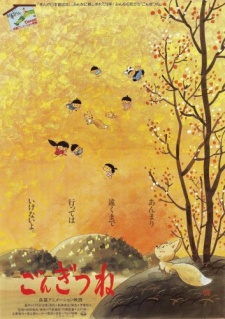
I actually don't know a lot about author Nankichi Niimi, which is surprising because a look around the web gives him the title “the Hans Christian Andersen of Japan”, and despite how those sorts of titles are usually pretty useless that would seem enough of a statement to warrant a fair presence in the anime adaptation sphere, alongside people like Miyazawa Kenji and Yumemakura Baku. I unknowingly watched the most recent of his three adaptations a few years prior in the wonderful Anime Mirai short Ojii-san no Lamp, and eventually I'll be able to watch his stories in Japan Masterpiece Fairytale Series along with Dazai Osamu. Luckily his “magnum opus” Gongitsune was also adapted and the result is up on Youtube for people who speak Japanese, or don't mind filling in the relatively few dialogue lines for themselves.
The dialogue isn't that important, considering most of it is spoken by a kid who wears his thoughts and desires on his sleeve, or rather his fur. Gon is a fox who survives his mother being hunted down, but unlike Bambi his lack of a parent to raise him turns him into a tinier Dennis the Menace, stealing food all around the village nearby. Anything is fair game, from temple offerings to fish sitting in the fisherman's basket not a minute after being caught. His mentality isn't cruel per se, he just feels entitled to it, enough to endure being chased by the hot-tempered Hyoju each and every time.
But things make a significant turn in the final stretch. Gon steals an eel from Hyoju but leaves it behind after a chase, leaving it to die on land. That night Hyoju's mother dies, the eel he caught being the nutrition she might have been able to live another day off of. Gon reflects on these two deaths and begins to steal for Hyoju's sake in an attempt to repay his sins, but an interesting shot shows him spilling and leaving fish from the basket on his way to Hyoju's house, which to me made it seem like he didn't really understand the message about life.
Perhaps it's as a result of this that Gon ends up becoming the agent of teaching instead of learning. Another eel rekindles Hyoju's anger, which distances himself from his close friend in a brief scene. In the next scene he peeks from a dark room, isolated and blinded by the past, while Gon comes to bring him more food. A gun shot brings the story to a tragic conclusion, the final blow softened by the image of children playing in a field of flowers instead. In the end Hyoju is the one who learns about the value of life, but just as Gon was too late to save Hyoju's mother—and too young to save his own—Hyoju sees the pile of food that Gon had brought him just a moment too late.
I'm not sure what to make of how Gongitsune used its hour, with a forty minute comedic buildup to a twenty minute tragedy, but like with the image of Gon leaving the fish behind the impact was sufficient to make me think it was planned more cleverly than it seems. At the start it seemed like Gon's mother dying would leave us with a tooth-and-nail survival story for Gon, but the charming little furball and the comedic tone shifted me away from that mindset pretty quickly. Then even as I expected the mother to die, the delay and lack of tonal shift made it seem like it might be a moral intermission, a teaching moment so the prankster could learn a bit and grow up more mature. But just as I began to doubt that narrative, the last ten minutes packed the real punch, and barely a minute after I was chuckling alongside the cheerful little Gon I was trying to reconcile with his death, and with Hyoju's split-second loss of control. Katsuragi Yuki plays off the film with a ballad, and the lessons are left to our imagination. I'll have to think on this one a little more, and I'm certainly interested in seeing more Nankichi works grace our screens.